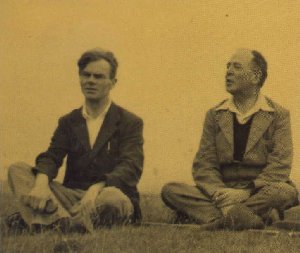| Second Friend |
While a "First Friend" is, of course, an individual with whom one sees eye-eye to on virtually all matters (Lewis's First Friend was Arthur Greeves), a Second Friend is altogether different. In a memorable passage in Surprised by Joy, Lewis offered an account of the nature of the "Second Friend":
But the Second Friend is the man who disagrees with you about everything. He is not so much the alter ego as the antiself. Of course he shares your interests; otherwise he would not be your friend at all. But he has approached them all at a different angle. He has read all the right books but has got all the wrong things out of every one. It is as if he spoke your language but mispronounced it. How can he be so nearly right and yet, invariably, just not right? . . . When you set out to correct his heresies, you find that he forsooth has decided to correct yours! And then you go at it, hammer and tongs, far into the night, night after night, or walking through fine country that neither give a glace to, each learning the weight of the other's punches, and often more like mutually respectful enemies than friends. Actually (though it never seems so at the time) you modify one another's thought; out of this perpetual dogfight a community of mind and a deep affection emerge. But I think he changed me a good deal more than I him.
Barfield's own First Friend was Cecil Harwood.
